“In the ever-evolving world of e-commerce, staying ahead isn’t just an advantage, it’s a necessity.”
When you’re scouring the internet for the best AI tools to enhance your e-commerce platform, you might find yourself asking: Which AI tools for e-commerce can provide the most personalized customer experience? How can AI streamline my business operations for better efficiency? What are the latest trends in AI tools for e-commerce? As Andrew Ng, a leading figure in AI, once said, “AI is the new electricity.”
The significance of integrating AI in e-commerce is no longer a matter of debate but a reality of the modern digital marketplace. Studies show that AI tools in e-commerce not only boost customer engagement but also significantly drive sales growth. By leveraging AI, businesses can analyze vast amounts of data for better decision-making, personalize shopping experiences, and automate tedious tasks.
My name is Alesia and I’ve been knee-deep in both the e-commerce and AI worlds for years. I’ve worked on AI solutions for some of the biggest names in the industry, and I have the technical chops to know what I’m talking about no fluff, just facts, and actionable insights.
By reading this article, you’ll understand the practical applications of AI tools in e-commerce. Also, you’ll have a clear understanding of the top AI tools in the market, their unique features, and how they can be applied to your e-commerce business.
| Name | Key Feature | Pricing | Target Audience |
| Flatlogic Generator | AI-powered web application development | Custom pricing | Enterprise-level businesses |
| ChatGPT by OpenAI | Advanced natural language processing | Free to start, then tiered pricing | Wide range, from individuals to businesses |
| Salesforce Einstein | AI-powered CRM insights and automation | Tiered pricing, based on usage | Salesforce users, medium to large businesses |
| Adobe Sensei | Creative intelligence for digital experiences | Based on Adobe Cloud subscription | Businesses using Adobe Cloud, marketers |
| Google Cloud AI | Custom AI solutions using Google’s ML technology | Pay as you go | Businesses needing custom AI solutions |
| IBM Watson | Data analysis and NLP for business solutions | Custom pricing based on requirements | Large enterprises, industries with complex data |
| Klevu | AI-driven search personalization for e-commerce | Custom pricing | E-commerce platforms |
| Algolia | Fast, relevant search and discovery platform | Free tier available, then priced by usage | Businesses with online platforms |
| Optimizely | Digital experience optimization with A/B testing | Free trial, then subscription-based | Medium to large businesses in e-commerce |

What is AI in E-commerce?
Artificial intelligence (AI) in e-commerce refers to the use of machine learning algorithms, natural language processing, and data analytics to automate, optimize, and personalize customer experiences and business operations. The technology goes beyond simple automation to provide cognitive capabilities that can understand, reason, learn, and solve problems.
Benefits of Using AI Tools in E-commerce
Let’s look at five key areas where AI can have an immediate and measurable impact on the e-commerce experience. Whether automating tasks for greater efficiency, using data to make more accurate recommendations, managing inventory, or scaling systems, AI offers tangible, quantifiable benefits. Each point is backed up with real-world examples. Let’s dive deeper.
Operational Efficiency
Automating routine, time-consuming tasks like these speeds up the entire shipping process, enabling faster delivery times. This not only improves customer satisfaction but also frees human employees to focus on tasks that require more nuanced decision-making. The result is a more efficient operational workflow that saves both time and operational costs.
Real-Life Example: Amazon uses Kiva robots in its warehouses to pick items from the shelves and deliver them to human workers.
Data-Driven Accuracy
Through precise data analysis, AI helps make highly targeted recommendations that maximize user engagement. When customers find what they’re most likely to enjoy with minimal effort, they will spend more time (and potentially money) on the platform, increasing lifetime customer value.
Real-Life Example: To recommend shows and movies, Netflix uses machine learning algorithms that analyze viewing history and other metrics.
Tailored Experiences
This type of personalized experience dramatically increases user engagement and satisfaction. It reduces friction in the online shopping experience by taking some of the guesswork out of buying products like makeup online, leading to higher conversion rates and lower return rates.
Real-Life Example: Sephora’s Virtual Artist app uses augmented reality to allow customers to try makeup virtually.
Scalability
Scalability is critical in e-commerce, especially during peak sales periods. AI’s ability to adapt to increased data and transaction volumes ensures a smooth customer experience and reduces shopping cart abandonment rates. This adaptability also eliminates the need for manual intervention, saving human resources and potential lost revenue.
Real-Life Example: During high-traffic events like Black Friday, Shopify’s AI systems automatically scale to handle the increased load.
Risk Management
Implementing AI for risk assessment and fraud detection provides a robust layer of security. This real-time analysis allows for immediate action, reducing financial losses and maintaining customer trust. At a time when cybersecurity threats are rampant, AI’s role in risk mitigation isn’t just beneficial, it’s essential.
Real-Life Example: To identify and prevent fraudulent transactions, Stripe uses machine learning to analyze thousands of signals in real time.
Top 10+ Ways to Utilize AI in E-commerce
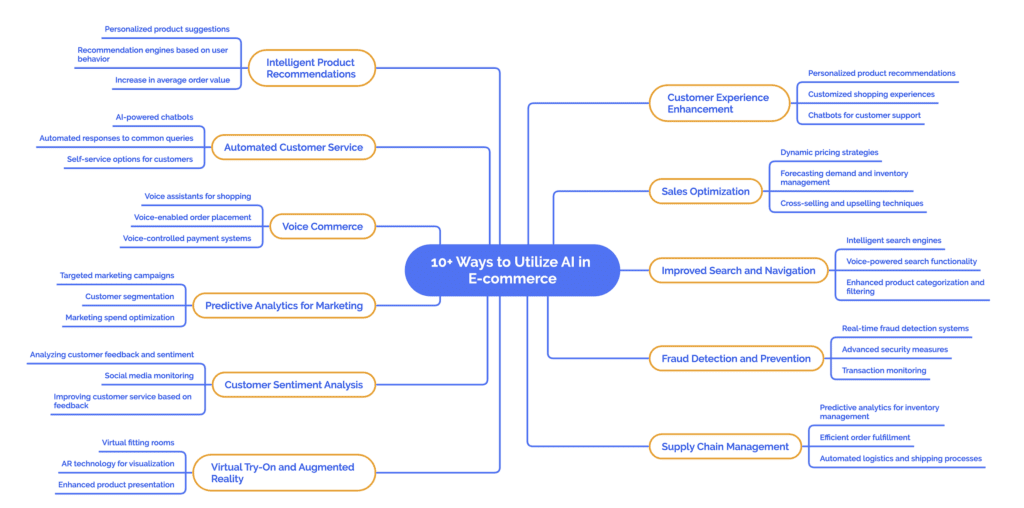
In today’s e-commerce landscape, standing out from the crowd isn’t an option-it’s a necessity. AI offers more than just bells and whistles and provides tangible methods to improve both the customer experience and operational efficiency. Here’s an in-depth look at how you can use AI to improve your e-commerce business.
1. Personalized Recommendations
AI analyzes various customer data points, such as past purchases and browsing history, to provide personalized product recommendations. This increases the likelihood of repeat sales and builds customer loyalty.
2. Chatbots for Customer Service
AI-powered chatbots can handle basic customer queries around the clock. This frees up human customer service agents to handle more complex issues, improving overall customer satisfaction.
3. Inventory Management
Using historical and real-time data, AI can predict when you’ll need to replenish certain items. This can help you optimize your inventory costs and avoid out-of-stocks that can lead to lost sales.
4. Dynamic Pricing
AI allows you to adjust your prices in real time based on a variety of factors, including demand, competitor prices, and current inventory levels. This helps you stay competitive and maximize your margins.
5. Fraud Detection
AI analyzes transaction data in real-time to flag potentially fraudulent activity. Rapid detection enables timely intervention, reducing the risk and impact of financial fraud.
6. Visual Search
AI can analyze images uploaded by customers to find similar or matching products in your inventory. This simplifies the search process and can lead to faster sales conversions.
7. Voice Search Optimization
As voice-activated search becomes more prevalent, AI can adapt your search algorithms to understand and process natural language queries, making your product listings more accessible.
8. Automated Marketing Campaigns
AI can segment your customer base based on various behavioral metrics. This enables highly targeted marketing campaigns, resulting in higher conversion rates and better ROI.
9. Sentiment Analysis
AI can scan various online platforms to gauge public sentiment about your brand. This can inform your PR and marketing strategies, allowing you to proactively address issues that could affect your reputation.
10. Virtual Try-On Features
Augmented reality capabilities powered by AI allow customers to virtually “try on” products, reducing the uncertainty often associated with online shopping and lowering return rates.
Bonus: Predictive Analytics
By analyzing existing data trends, AI can help you make predictions about sales, customer behavior, and potential supply chain issues. This enables proactive decision-making instead of reactive problem-solving.
Best AI Tools for E-commerce
Flatlogic Generator
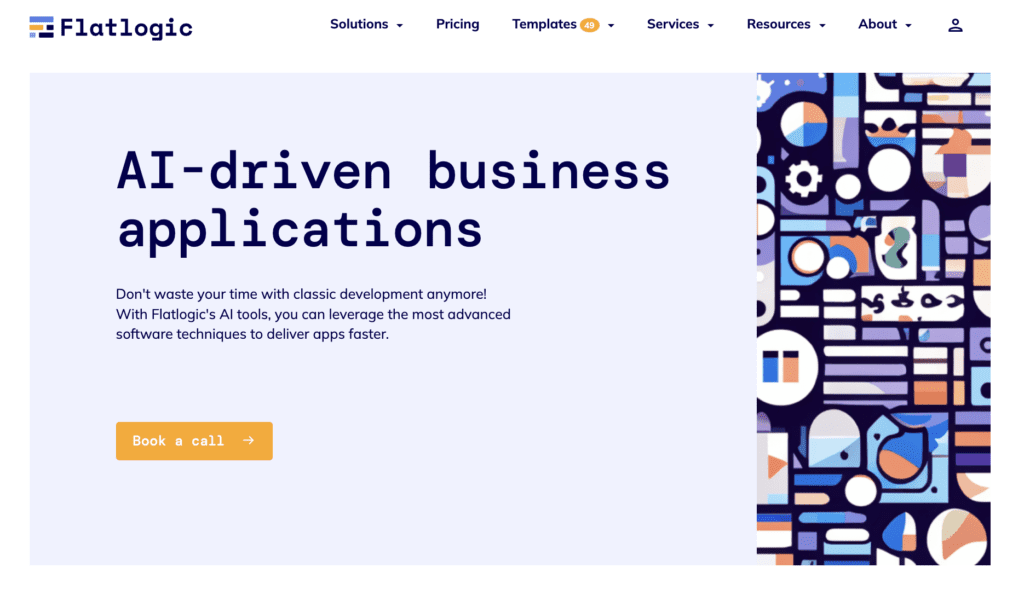
Flatlogic, with its innovative Flatlogic Generator, offers a unique AI-driven solution for e-commerce. This tool is designed to rapidly develop web applications through a blend of AI and user input. It’s particularly effective for creating ERP, CRM, CMS, and admin panels, tailored to the specific needs of e-commerce businesses.
Key Features: AI-powered development of web applications, support for creating ERP, CRM, CMS, and other data systems, and options for customization and scalability.
Pros: Enables rapid development and deployment of applications, provides code ownership and full customization capabilities, eliminates scalability issues, and ensures universal deployability.
Cons: It may require a certain level of technical expertise for customization, and primarily caters to enterprise-level applications that might not suit smaller businesses.
ChatGPT by OpenAI
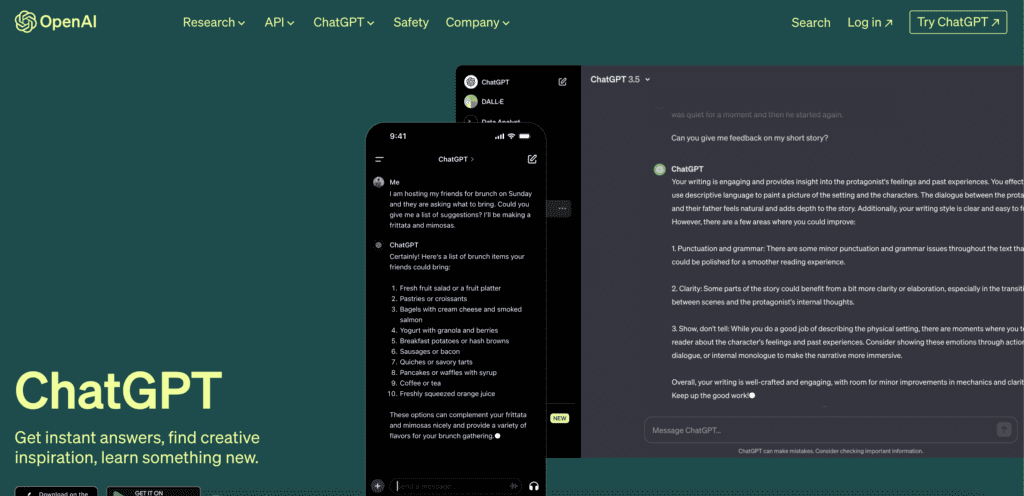
ChatGPT is designed to simulate human-like text conversations, answering queries, solving problems, or just chit-chatting. It’s highly versatile and can be customized for various e-commerce applications, such as customer support, product recommendations, or even to power conversational agents for shopping.
Key Features: Advanced natural language processing, ability to learn and adapt from conversations, integration with multiple e-commerce platforms, and APIs for customization.
Pros: Offers a highly interactive and personalized customer experience, reduces response time, and handles a high volume of queries simultaneously.
Cons: May generate incorrect or irrelevant responses, requires continuous training, and might struggle with highly nuanced or industry-specific language.
Salesforce Einstein
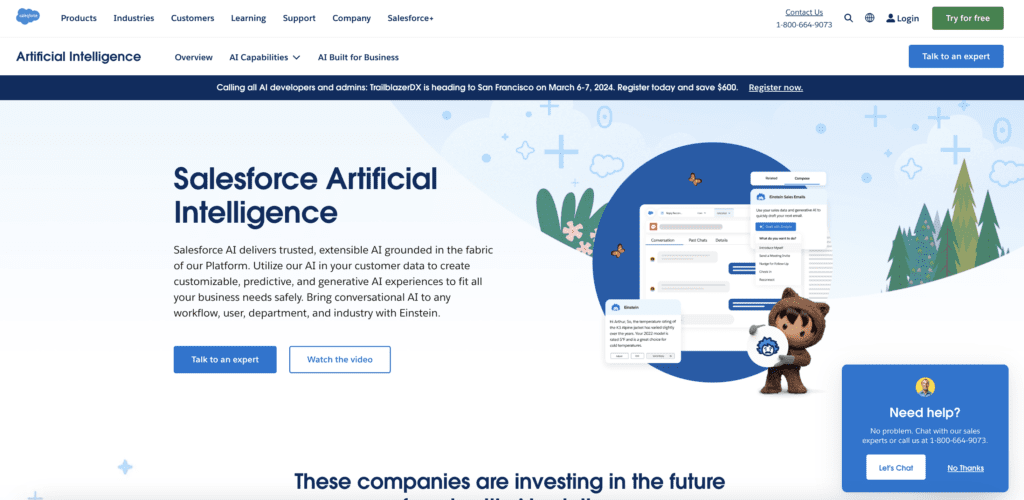
This AI layer integrated into the Salesforce platform enhances CRM with smart features. It uses data from Salesforce to predict trends, recommend actions, and automate routine tasks. It’s particularly useful for sales predictions, customer insights, and automated marketing strategies.
Key Features: AI-powered insights for sales forecasting, custom recommendations for next steps with clients, automated data entry and analysis, and predictive lead scoring.
Pros: Great for understanding customer behaviors and preferences, automates repetitive tasks and helps in making data-driven decisions.
Cons: Primarily beneficial for businesses already using Salesforce, can be complex to set up, and may require a significant investment.
Adobe Sensei
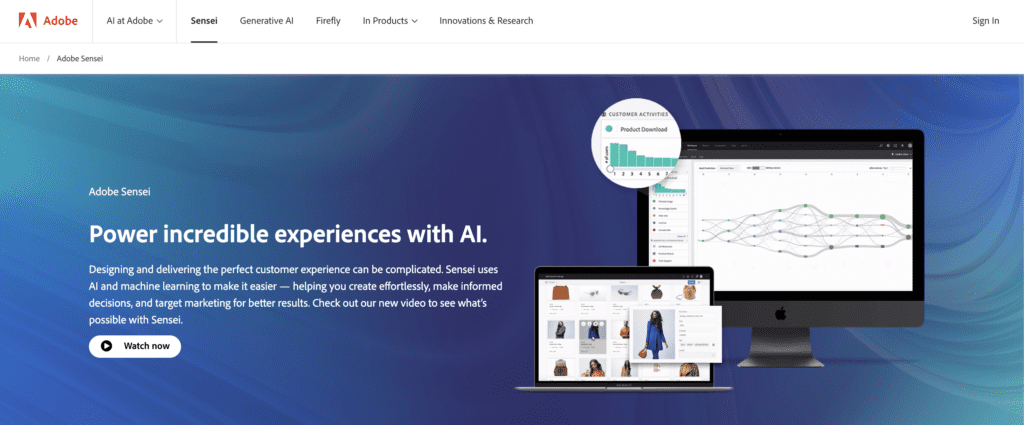
Part of Adobe’s cloud offerings, Adobe Sensei focuses on creative intelligence, helping in content creation, digital experiences, and marketing. It uses machine learning and artificial intelligence to automate tasks in Adobe tools, enhance creative workflows, and provide data-driven insights.
Key Features: Intelligent image and video recognition, automated tagging and metadata, personalization tools for marketing, and predictive analytics.
Pros: Streamlines the creative process, particularly in marketing, and helps deliver personalized customer experiences. Efficient at managing and sorting digital assets.
Cons: More focused on creative and marketing aspects, might not be as beneficial for other e-commerce areas, and requires Adobe Cloud products to be fully effective.
Google Cloud AI

Part of the broader Google Cloud Platform, Google Cloud AI offers a range of machine learning and AI tools that can be used for various applications, including e-commerce. It allows businesses to leverage Google’s advanced machine learning technologies, like AI-driven insights, speech-to-text conversion, and natural language processing.
Key Features: Includes Vision AI for image analysis, Natural Language AI for understanding customer feedback, and AI Platform for custom model development.
Pros: Powerful and scalable, excellent for businesses needing custom AI solutions. Integration with Google’s vast data analytics and machine learning capabilities.
Cons: Requires technical expertise to set up and manage. Costs can scale significantly with use.
IBM Watson
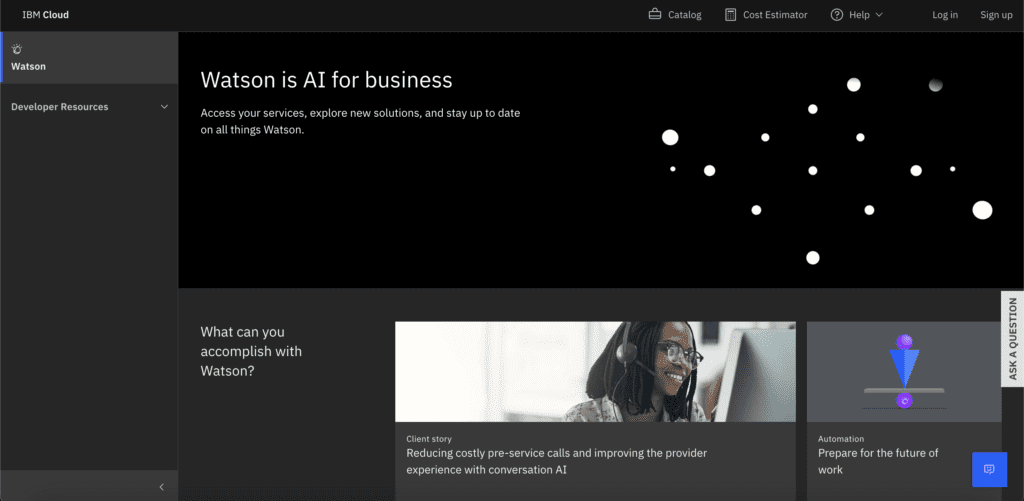
Known for its prowess in natural language processing and machine learning, IBM Watson provides AI-powered solutions that can analyze and interpret all forms of data. In e-commerce, it can be used for personalized marketing, customer service automation, and supply chain management.
Key Features: Watson Assistant for building conversational interfaces, Watson Discovery for uncovering deep insights from data, and Watson Studio for creating and training AI models.
Pros: High accuracy in data processing and analysis, particularly with natural language. Trusted by large enterprises.
Cons: The complexity of tools can be a barrier for smaller teams. The cost might be prohibitive for small to medium-sized businesses.
Klevu
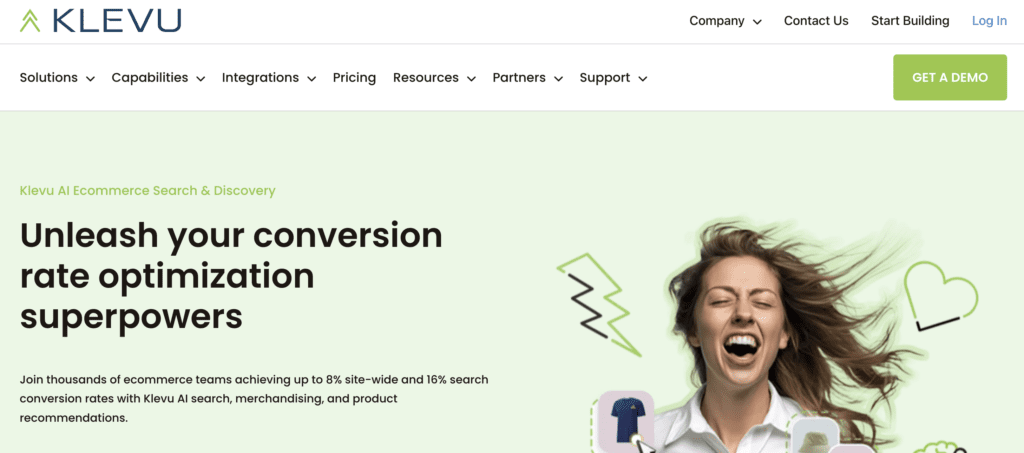
Klevu is a search and personalization engine designed specifically for e-commerce sites. It uses AI to understand customer intent and deliver more relevant search results, enhancing the shopping experience and increasing conversion rates.
Key Features: Smart search functionality, AI-powered product recommendations, and real-time analytics.
Pros: Easy to integrate with major e-commerce platforms, improves customer experience and engagement. Effective in increasing sales conversions.
Cons: Focuses mainly on search and recommendation, lacking broader e-commerce AI functionalities.
Algolia
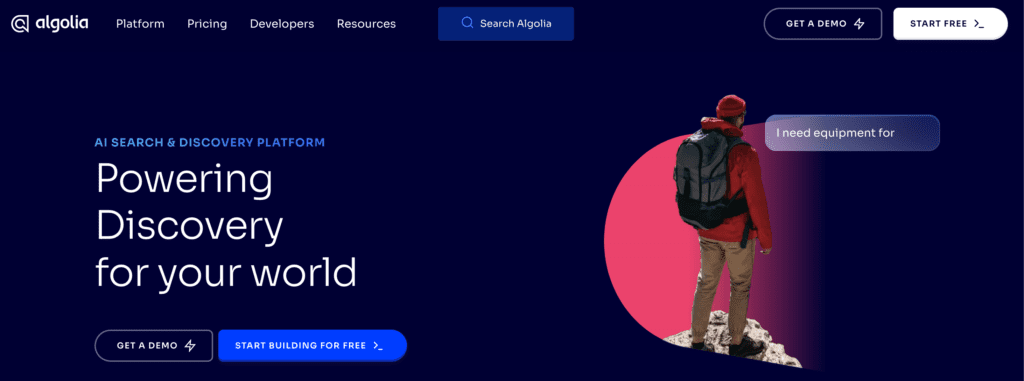
Algolia offers a powerful, API-first platform that enables businesses to implement fast, relevant search and discovery experiences on their websites and mobile apps. It’s designed for ease of use and quick implementation.
Key Features: Instant search results, customizable relevance tuning, and user-friendly analytics dashboard.
Pros: Enhances user experience with fast and accurate search results. Easy to scale and offers detailed analytics to understand user behavior.
Cons: Can become expensive with high usage. Mainly focused on search capabilities.
Optimizely
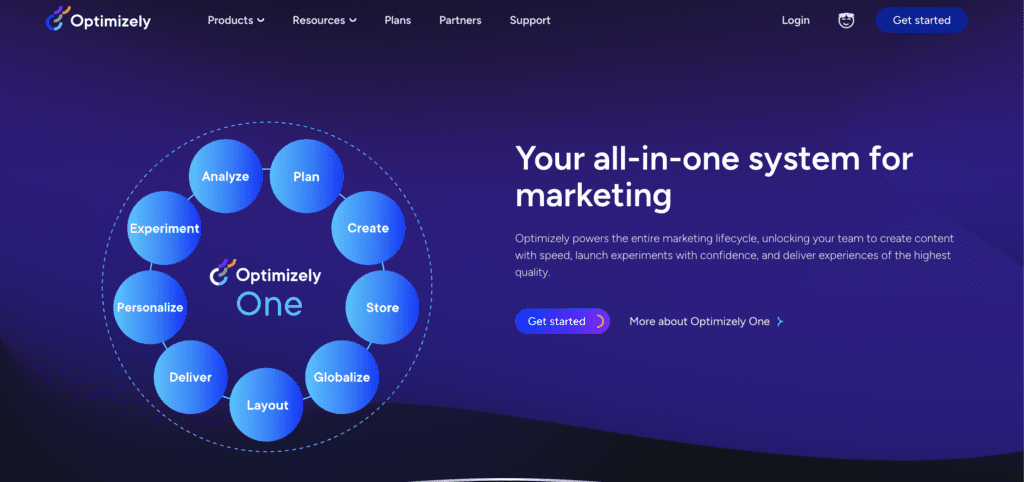
Optimizely specializes in digital experience optimization, primarily through A/B testing, multivariate testing, and personalization. It’s an AI-powered platform that helps e-commerce businesses test, learn, and personalize user experiences to drive better outcomes.
Key Features: Robust A/B testing tools, personalization features, and advanced analytics for optimizing website performance.
Pros: Effective for improving website usability and conversion rates. Offers strong experimentation and personalization capabilities.
Cons: Requires a degree of technical know-how to fully utilize its features. More suited for medium to larger businesses due to complexity and cost.
Conclusion
The way I see it, AI tools in e-commerce is not just another shiny object, it’s a game changer. We’re not talking about a temporary increase in numbers, we’re talking about a structural change in the way e-commerce works. The applications are as broad as they are impactful – streamlining operations, reducing costs, and tailoring the customer experience like never before.
In conclusion, this article has provided an in-depth look at the top AI tools that are reshaping e-commerce. From the versatile conversational AI of ChatGPT to the predictive power of Salesforce Einstein, the creative insights of Adobe Sensei, the custom solutions of Google Cloud AI, and the analytical depth of IBM Watson, these tools are critical to modern e-commerce strategies. In addition, specialized tools like Klevu, Algolia, and Optimizely address specific needs like search personalization and user experience optimization.
As you move forward, the key is to assess which of these tools align with your business goals and customer needs. Whether it’s improving customer interactions, streamlining operations, or using data analytics to make informed decisions, the right AI tool can make a significant difference in your e-commerce journey.
